Kashmiri delicacies that must not be missed!

Mail This Article
‘Agar Firdaus bar-rooh-e zameen ast, Hameen ast-o, hameen ast-o, hameen ast!’ – Amir Khusrau
If there is a paradise on earth, it is here, it is here, it is here – This famous couplet was written by the poet Amir Khusrau on Kashmir’s breath-taking beauty. This couplet comes to my mind every time I think of the mouth-watering cuisine Kashmir has to offer.
Though known all over the country for its Roganjosh, there is a lot more to Kashmiri cuisine than what meets the eye. Contrary to common belief, most Kashmiri dishes are not very heavily spiced. They are mild in taste but rich in flavours because of the use of spices like cardamom, fennel, ginger, cinnamon, cloves and saffron.
Kashmiri cuisine is influenced by Mughal cuisine and hence is predominantly non-vegetarian but also has some wonderful and lesser-known vegetarian delicacies.
Let us have a look at some of the mouth-watering varieties that Kashmiri cuisine has to offer:
1. Roganjosh
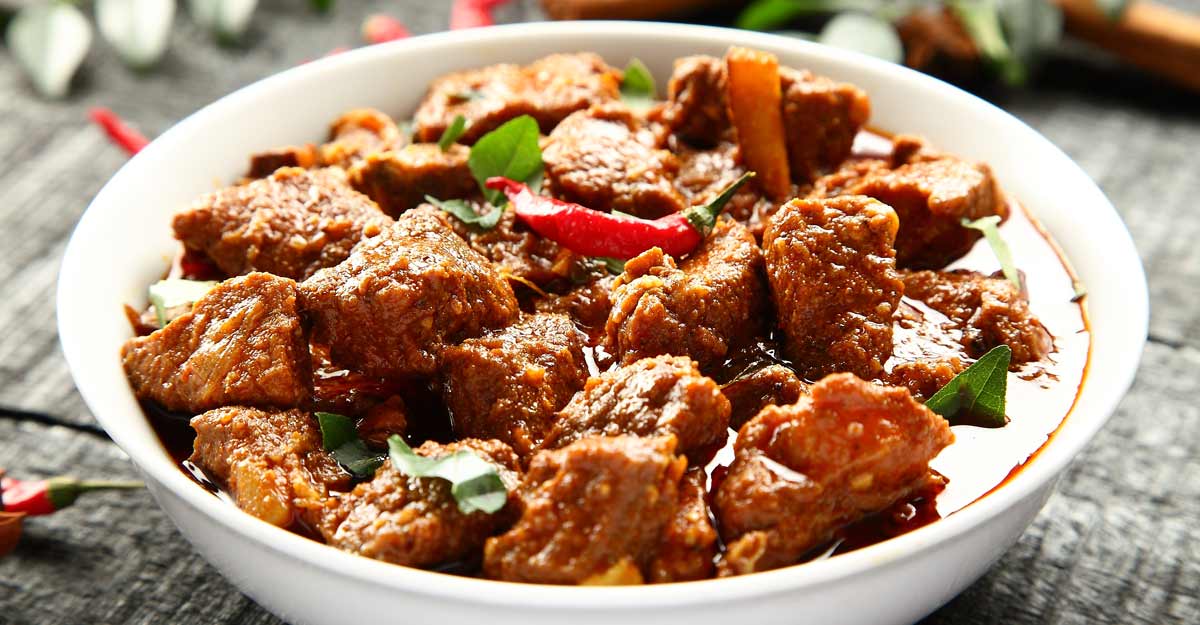
For those who are unfamiliar with Roganjosh, it is a delicious and flavoursome lamb dish that is a must-have for all lamb or meat lovers. Rogan means oil or fat while Josh means intense heat directly translating to meat that is cooked in oil at intense heat. Roganjosh was introduced to Kashmir by the Mughals and is known as one of the signature dishes of Kashmiri cuisine, all over the country. It is made with browned onions, spices like cardamom, cinnamon, Kashmiri red chillies and yoghurt. A special ingredient known as the Mawal or the cockscomb flower is also added to Roganjosh to get the red colour. It can be had with naan although rice is more commonly consumed with it in Kashmir.
2. Modur Pulav
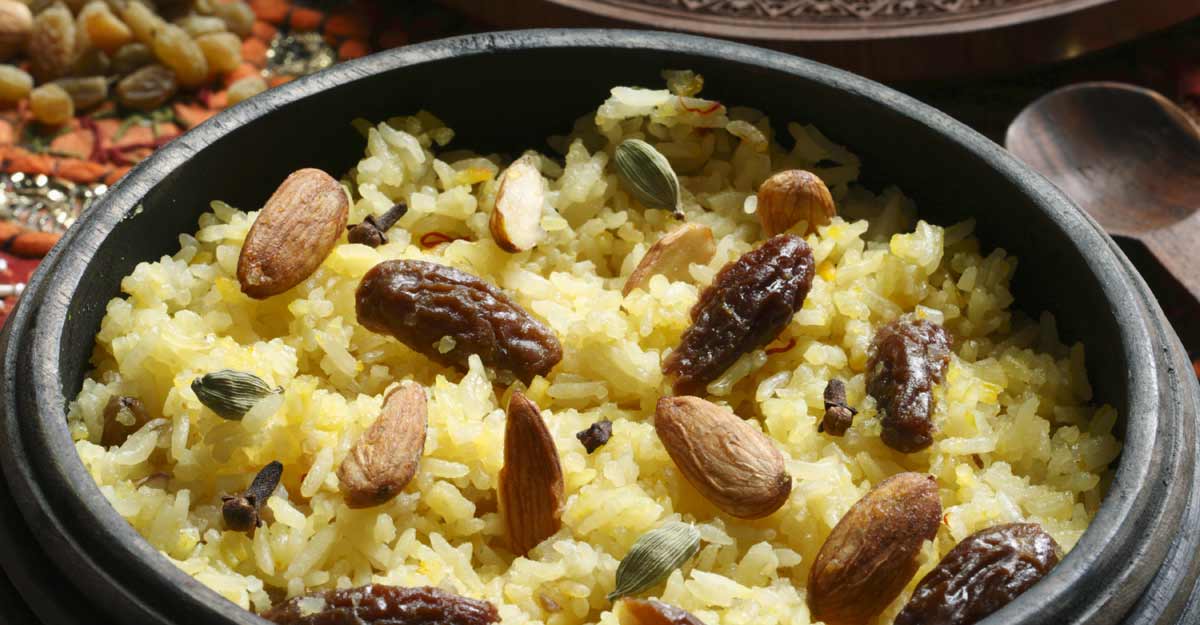
This is a sweetened Kashmiri rice dish that is prepared with milk, sugar, saffron and ghee. One can also add dry fruits like cashews and almonds to the rice. The saffron used in this sweet pulao gives it a rich flavour and colour
3. Matschgand
Full of flavours, Matschgand is a non-vegetarian dish made from minced meat that is shaped into croquets and cooked in a spicy, red gravy.
4. Yakhni
Yakhni, also referred to as yoghurt lamb curry, is a dish that oozes rich flavours, while still being light on the stomach. As the name suggests, Yakhni is a yoghurt-based lamb curry that is cooked with onion paste, cardamom, fennel seeds, bay leaves, cloves, mint leaves and of course yoghurt. Yakhni is usually enjoyed with plain rice.
5. Dum Olav
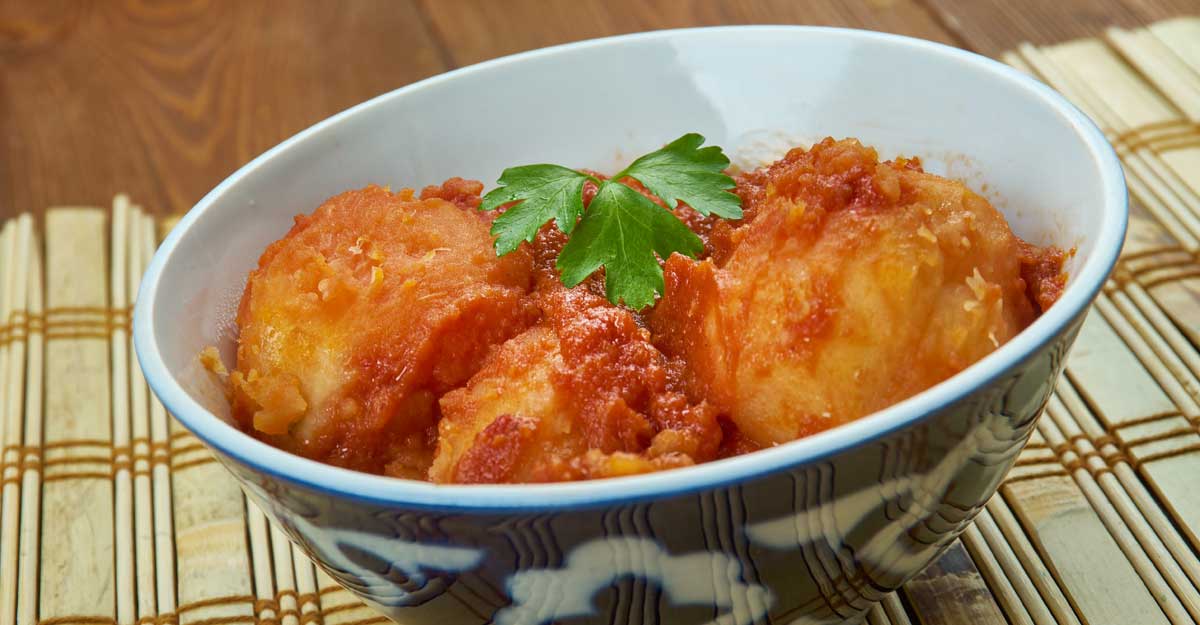
Dum Olav or Dum Aloo is a well-known Kashmiri vegetarian dish. The Kashmiri Dum Aloo is cooked with yoghurt, ginger, fennel and other rich spices that give the dish its aroma and flavours.
6. Kashmiri Muji Gaad
Gaad or Gada means fish in Kashmiri and Muji refers to radish. The fish is cooked along with radish and various other spices. The fish and radish blend together to give this dish its unique taste. Another variety of this dish is the Nader Ti Gaad in which fish is cooked along with lotus stem. The Kashmiri Muji Gaad is usually had on festivals days like Eid, Navroze and Gaddi Batti
7. Aab Gosht
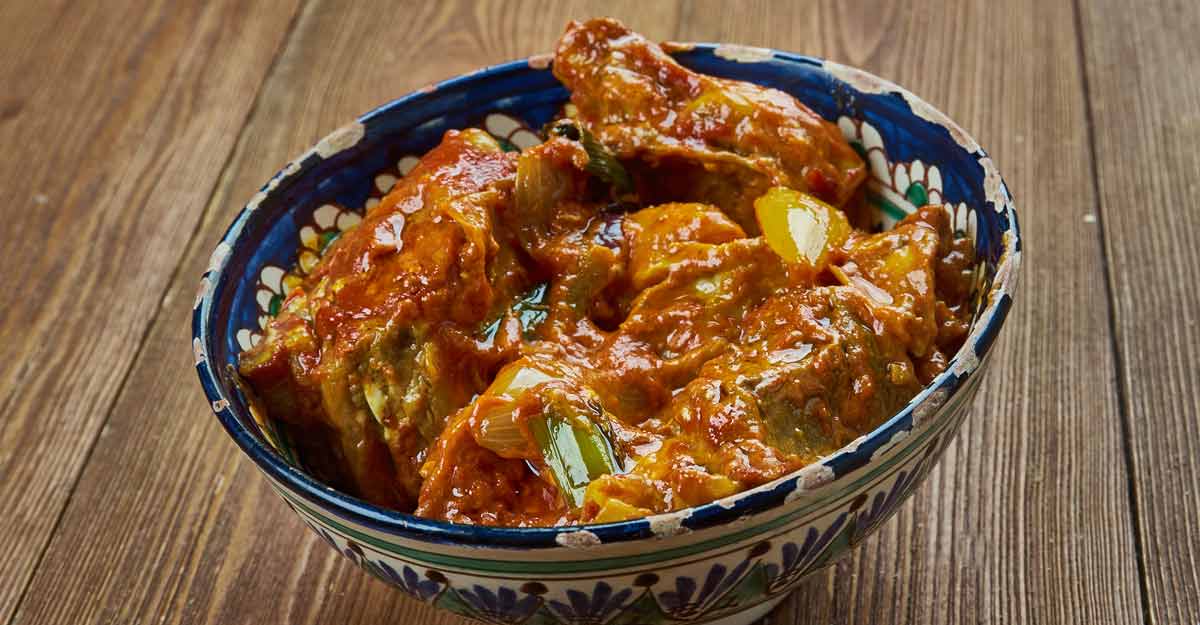
Mutton is one of the most predominantly used non-vegetarian ingredients in Kashmiri cuisine. A popular mutton-based dish in Kashmiri cuisine is the Aab gosht wherein the mutton is first boiled in water along with salt, ginger, garlic and aniseed powder. Milk is boiled separately along with spices such as cardamom, onion, pepper and ghee. The lamb is then added to this milk and cooked together. The milk makes the mutton so soft and tender that it almost melts in your mouth!
8. Goshtaba
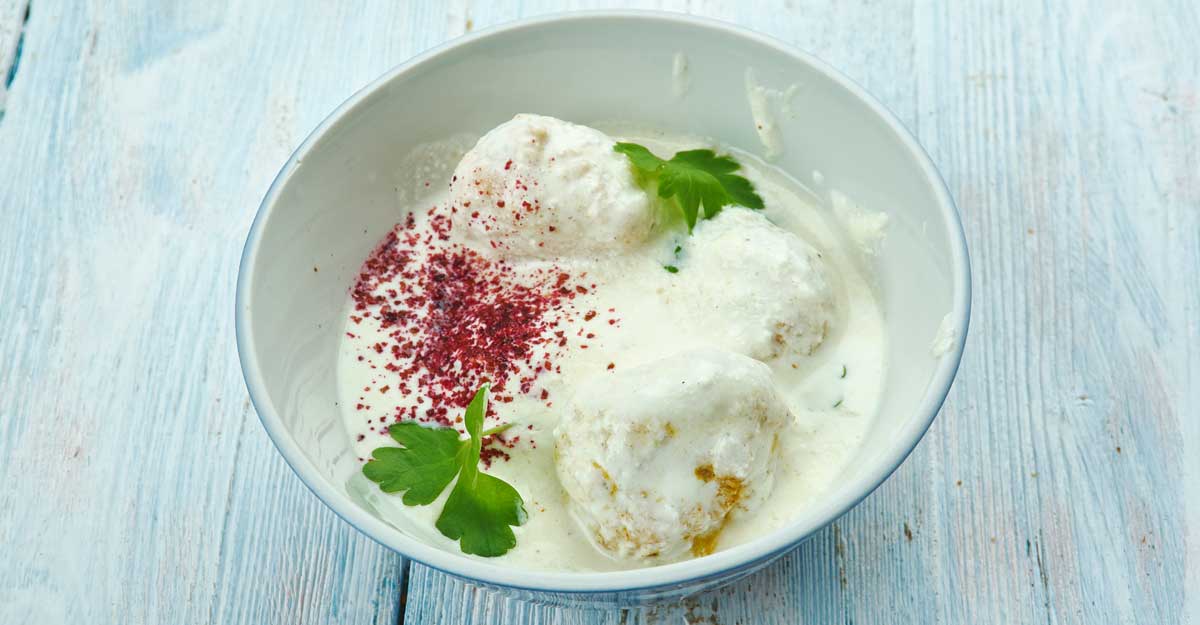
A true Kashmiri delicacy, the king amongst all mutton-based hailing from Kashmir is the Goshtaba. Popular on special occasions like weddings, Goshtaba is made from minced mutton that is shaped into meatballs and then cooked in yoghurt that is flavoured with spices. A predominant flavour found in this dish is that of cardamom. Goshtaba is served on special occasions like weddings.
9. Lyodur Tschaman
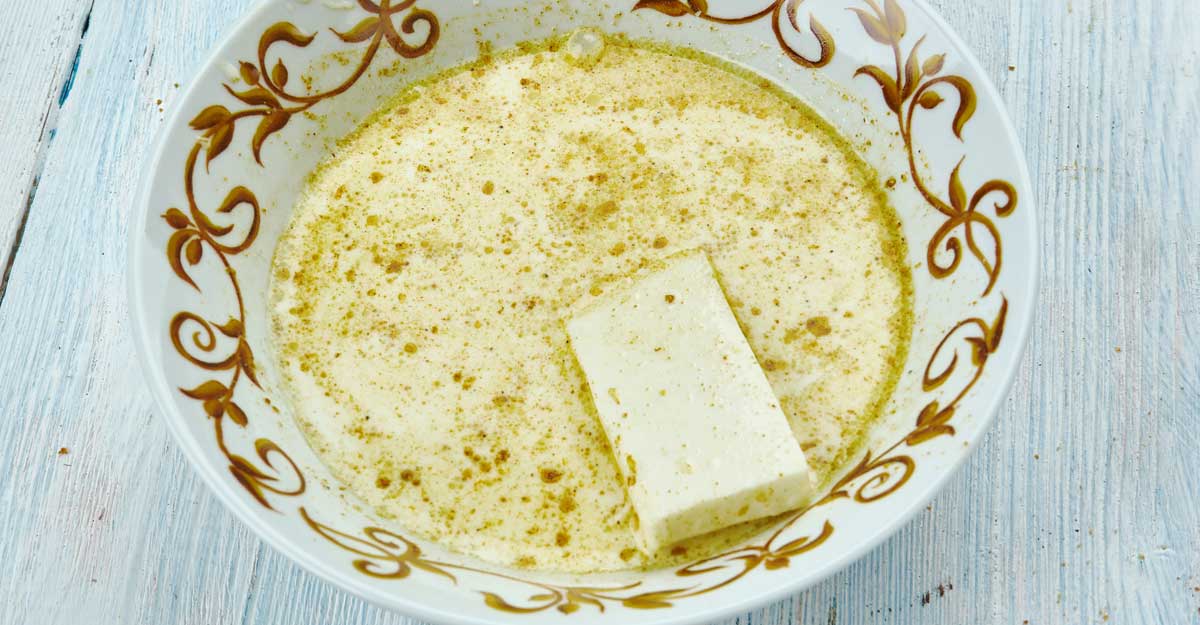
A vegetarian delight, Lyodur Tschaman is a favourite amongst Kashmiri vegetarians. Tschaman means cottage cheese in Kashmiri. In this dish, the cottage cheese is cooked in a rich and creamy gravy with turmeric, saffron and other spices and is had along with rice or naan. Another version of this dish is the Ruwangan Tschaman where the cottage cheese is cooked in a rich tomato-based gravy.
10. Tabak Maaz
The Tabak Maaz is popularly served as a part of wazwan. It is essentially meat extracted from the rib of a sheep, that is cut into small pieces, marinated with salt and turmeric ,and then steamed or cooked. The bones are removed after steaming and the meat is then cooked once again in clarified butter along with cardamom, fennel and ginger, over a low flame, until the meat becomes crispy.
11. Rista
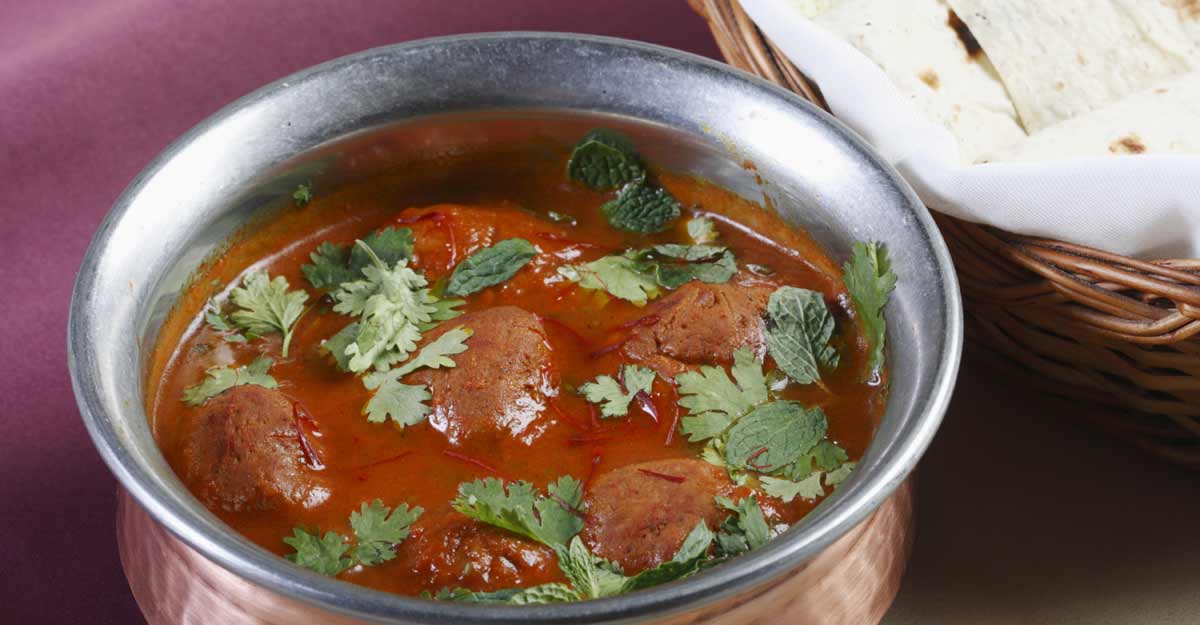
Rista is essentially meatballs that are prepared from minced meat, salt, cumin and cardamom seeds. The meatballs are then cooked in a gravy that is made from oil, red chilli extract, ground spice mixture and other condiments. It is usually served along with rice.
12. Haak Saag
Another vegetarian delight is the Haak. Haak refers to the collard greens found in Kashmir or to the leafy portion of the Knol Khol vegetable. Similar to spinach it is cooked in mustard oil along with other spices. Meat or chicken can also be added to Haak to make it more filling. It is also usually eaten with rice.
Although famous for its scenic beauty, one can also strongly contend that Kashmir or Kashmiri cuisine is truly Jannat for all food lover’s as well! So, whether planning to visit Kashmir soon or heading to that Kashmiri restaurant in town or even planning to cook a Kashmiri wazwan in your kitchen, don’t forget to try some of these authentic dishes and share your feedback and pictures with us!

